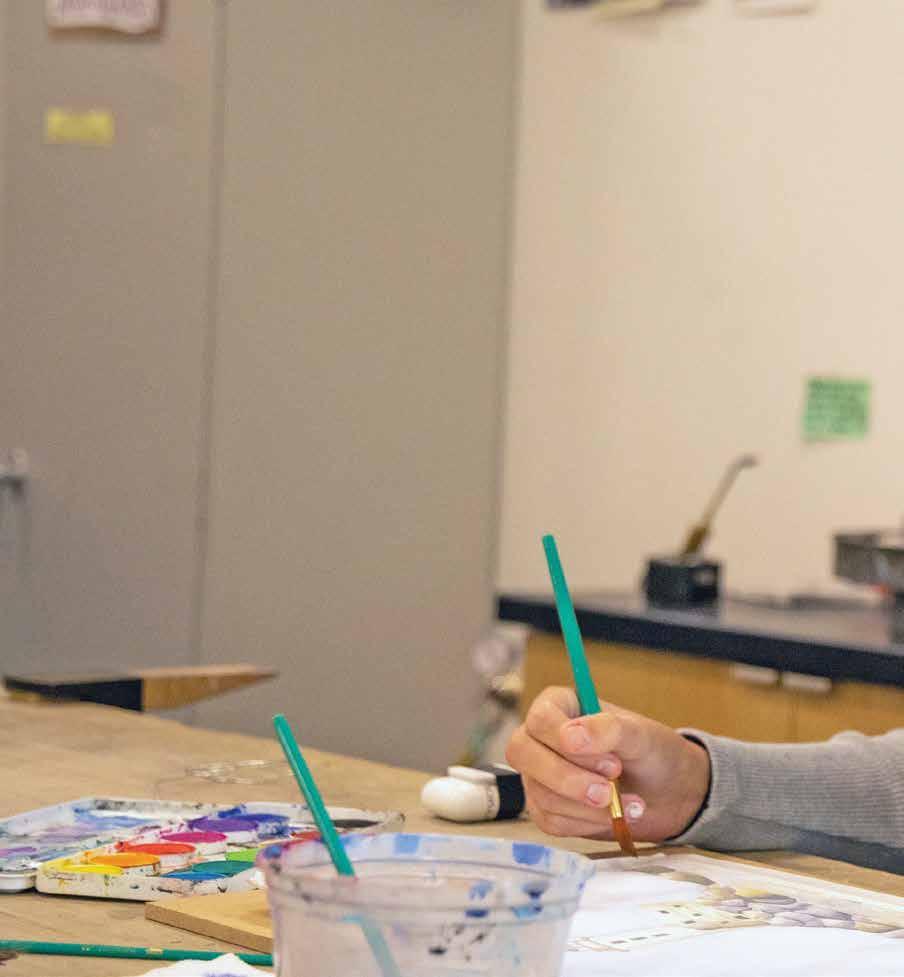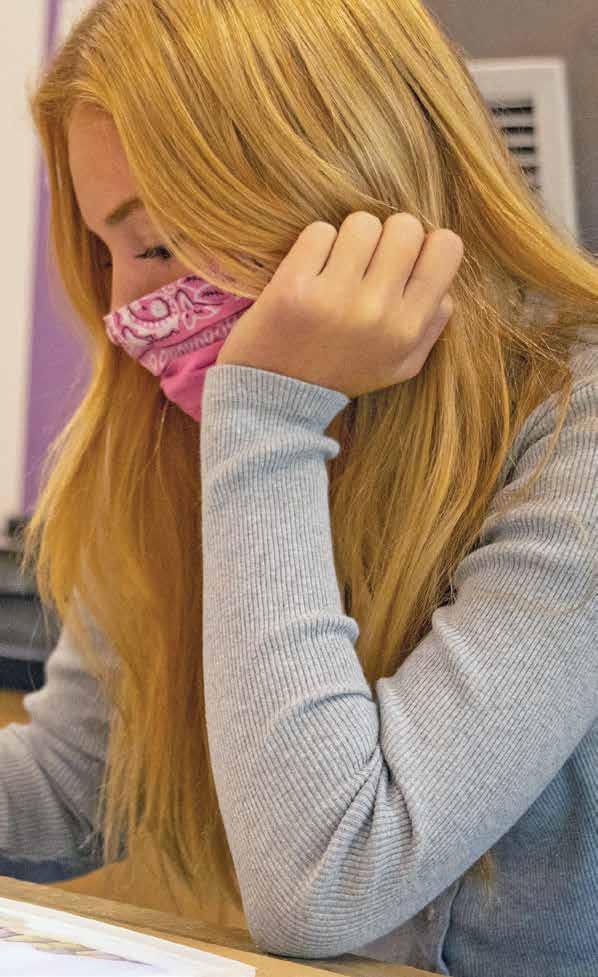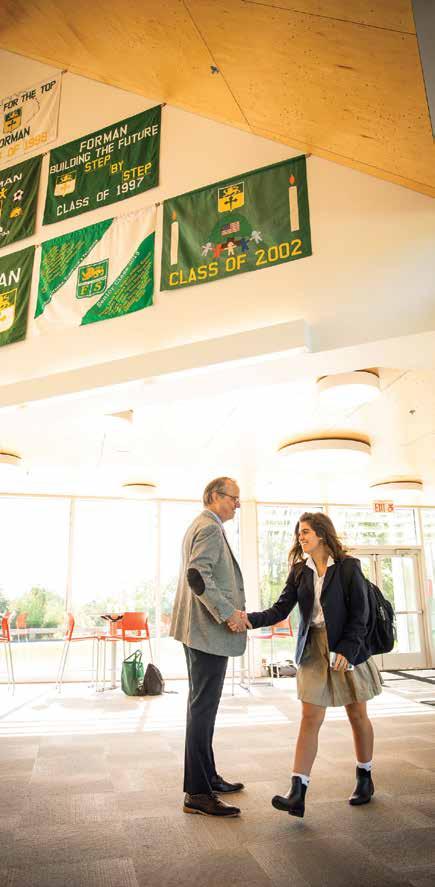
6 minute read
Head of School Letter
FORMAN LETTER
2 Head of School Letter 6 Reopening Forman During a Pandemic 12 Welcome to the Club 14 Around the Green 16 Campus News 18 Ingenuity Year 19 A True Friend of Forman 20 Commencement 24 Athletics in the Time of COVID-19 26 Standing Against Racism 28 Alumna Profile: Noel Robbins Congdon ’46 30 Alumnus Profile: Nick Fuglestad ’89 32 Giving 33 Class Notes
Head of School: Adam K. Man P’15 Associate Head of School: E. Michael Kowalchick Assistant Head of School for Institutional Advancement: Justin B. Solomon Director of the Annual Fund: Sean Maguire ’89, P’22, P’23 Director of Database Management: Susan Reis P’07 Address corrections & Class Notes: alumni@formanschool.org Editor: Kerry Conroy, Director of Communications Lead Writer: John Hassan Photo Editor: Kerry Conroy, Director of Communications Class Notes Editor: Liz Funk P’12, Director of Parent and Alumni Programs Designer: Julie Hammill, Hammill Design Photography: Ashli Langill, Julian Schnitt ’23, Richard Schultz, Zack Zampaglione, Austin Zimmer

This page: Merritt Seymour ’23 paints in art class. Cover: The Forman Lion statue stands tall and strong with its mask on.
Mission Statement
Forman School is an independent, coeducational, college preparatory school for boarding and day students with identified learning differences. Forman develops the whole student, based on his or her unique learning profile, so that every graduate becomes an educated, confident, self-advocate throughout life.
Forman School Board of Trustees
President of the Board Jon E. Zagrodzky P’18, P’19 Vice President Anne Q. Buckley P’13, P’20 Vice President David H. White ’71 Treasurer Thomas G. Sorell P’12 Secretary Michael L. Cook P’15
Barbara Chace ’87 Elizabeth Garber Daniels ’93 L. Laird Davis Eric R. Ebbert P’16 Elena A. Ford P’18 Michael C. Gluck ’06 Annette R. Jenner-Matthews, Ph.D. ’87 Preethi Krishna P’16 Gregory M. Loss P’22 Adam K. Man P’15, Head of School David A. Shaggy ’85 Timothy B. Wills ’85, P’21 Michael B. Yormark ’09
Trustees Emeriti Cecelia J. Johnson P’91 Diane F. Kessenich P’86, Chairman Emerita Kenneth R. Latham ’48 Frederick M. Lione Jr. P’91 John A. Meyers P’84 Peter L. Phillips ’65 Scott M. Sutherland ’69, P’93
HEAD OF SCHOOL LETTER
Enduring Lessons of the Pandemic
As I look out my window, snow is falling on the Forman campus. A big, wet, heavy snow that falls in clumps rather than flakes, quietly blanketing our campus in white. I look down across the fields to where our Outside Student Center once stood, but instead of the tents there is just a skeleton of poles, beams, and a few strings of light. Almost everything has been put away for the winter since the students departed for Thanksgiving. Campus is mostly still, with just the occasional faculty member walking their dog. We will end the calendar year the way we ended the last school year, with students dispersed and learning occurring remotely. Our full attention is now turned to the students’ return after Winter Break. This planning began almost as soon as the students returned to campus this fall. It has been a process of regular revision. As each week goes by, we learn more about the virus and how to function within the world it has created. We learn not just about the virus, but also about the ways we are able to cope; what our real priorities should be; what things we can reasonably ask of our students and faculty; what parts of the program that have surprising value; and what things we miss the most about the time before.
It would be an understatement to say that no one in the field of education was prepared for what we would need to change due to the pandemic. We like to pride ourselves on our expertise and our ability to teach that to others. In that light, I would like to share some simple lessons learned from this experience.
Technology will not overturn schooling as we know it
Since the very earliest times when students attended a school, we have heard adults complain that the quality of education, and the work ethic of young people, is not nearly as strong as when those adults were young. The writings of ancient Greek and Roman scholars are filled with these lamentations. Students are lazier, standards have fallen, teachers are not as good, and education has somehow lost its direction. Century after century these complaints have been aired. I do not think our educational system has been on one long decline since ancient times. It has changed and adapted over the years, perhaps too slowly and somewhat behind the times, but not in a measured devolution to a lowest common denominator. There are real issues we should address, but it helps to remember that the process of educating young people has always had its problems. Over the past few decades, the pace of technological change has been astounding and we have seen many industries transformed by innovation. There has been a lot of eager anticipation for technology to upend the current educational paradigm. Zoom, LMS, Google Docs, and a range of other software applications have allowed us to keep our schools functioning in the face of this pandemic. I am very grateful for this fact but I do not think anyone who has experienced it thinks this is the beginning of the end for education. Spend a couple of days teaching over Zoom and you will know what I am talking about.
At the same time, this experience has increased our
understanding of the value of many parts of the educational experience prior to the pandemic. Having my students all together in the same room with me cannot be easily replicated in a virtual world. As a teacher, I have also learned that worthwhile collaboration between students is hard to facilitate remotely, that most parents do not want to be teaching assistants, that bedrooms and kitchen tables are not the ideal venues for most types of learning, and that it is far easier to identify student misunderstandings, and correct them, when students are physically in front of me.
School is not just about reading, writing, and arithmetic
Shortly into the pandemic, government and business leaders realized schools play an important, albeit hidden, role in society. They are places for children to go when parents need to work. It is an unpleasant realization. We like to think the sole value of schools is to teach students the three “Rs”: reading, writing, and arithmetic (plus some measure of science, history, literature, etc.). But schools have always filled many more roles than just the obvious academic function. Children gain a lot more from the experience of school than just a set of skills and content knowledge. Some of this learning is painful, ranging from dealing with a bully to coming to terms with the fact that large institutions can, at times, be cold and impersonal. Much of the learning is much more positive, though. Students benefit from countless moments inside and outside of the classroom that we do not automatically think of as the role for school. The value of learning to lose gracefully when your team faces defeat by a rival. The value of running for class officer and winning the election. The value of gossiping with your friends about the upcoming school dance. The value of learning to seek out extra help when you are confused. Humility, leadership, fellowship, and interdependence are traits that are taught and reinforced daily in the school experience. Perhaps even more important than these experiences is the experience of mentorship. An adult, outside of your family, who takes an interest in your growth and development leaves an indelible mark. So often when I talk with people about what I do for a living, they will share with me a story about a teacher that altered their life for the better. Not so much that their teacher taught

Head of School Adam K. Man P’15 greets Hannah Levy ’21 with a handshake before morning Assembly in the fall of 2019.

